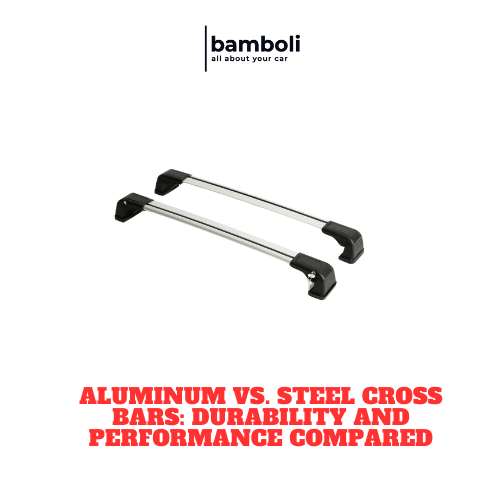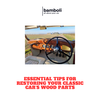Aluminum vs. Steel Cross Bars: Durability and Performance Compared

Aluminum vs. Steel Cross Bars: Durability and Performance Compared
In the debate between aluminum and steel cross bars for your vehicle, the question of durability and performance is paramount. Choosing between these two materials can have a significant impact on the overall quality and longevity of your cross bars. Both aluminum and steel have their own strengths and weaknesses, so it's important to understand the differences between them before making a decision. Let's explore the key factors to consider when deciding which type of cross bars is best suited to your needs.
Comparing the Durability of Aluminum and Steel Cross Bars
Choosing the right cross bars for your vehicle, one of the key factors to consider is durability. Aluminum and steel are two common materials used for cross bars, each with its own strengths and weaknesses. In this article, we will compare the durability of aluminum and steel cross bars to help you make an informed decision.
Aluminum Cross Bars
Aluminum cross bars are lightweight and resistant to corrosion, making them a popular choice among vehicle owners. However, their durability may be a concern for some. Here are some key points to consider:
- Strength: Aluminum cross bars are generally not as strong as steel cross bars. They may not be able to withstand heavy loads or intense off-road conditions.
- Flexibility: Aluminum has a tendency to bend under pressure, which can affect the overall durability of the cross bars.
- Corrosion Resistance: One of the main advantages of aluminum is its resistance to corrosion, making it a suitable option for long-term use in various weather conditions.
Steel Cross Bars
Steel cross bars are known for their strength and durability, making them a reliable choice for heavy-duty applications. Here are some key points to consider:
- Strength: Steel cross bars are much stronger than aluminum cross bars, making them suitable for heavy loads and rough terrain.
- Rigidity: Steel is less likely to bend or flex under pressure, ensuring the overall stability and durability of the cross bars.
- Corrosion Resistance: While steel is prone to rust, modern coatings and treatments can help improve its corrosion resistance, making it a viable option for long-lasting performance.
In conclusion, when comparing the durability of aluminum and steel cross bars, it is important to consider the intended use and load capacity of your vehicle. While aluminum may offer lightweight and corrosion-resistant benefits, steel provides superior strength and rigidity for heavy-duty applications. Ultimately, the choice between aluminum and steel cross bars will depend on your specific needs and preferences.
Analyzing Performance Differences between Aluminum and Steel Cross Bars
Choosing the right material for cross bars, whether for a roof rack or other structural applications, the decision between aluminum and steel can have a significant impact on performance. Both materials have their own unique properties and strengths, making it important to carefully analyze the differences in performance.
Strength
One of the key differences between aluminum and steel cross bars is their strength. Steel is known for its high tensile strength, making it a popular choice for applications that require heavy loads or high stress. On the other hand, aluminum is lighter in weight but may not have the same level of strength as steel. When considering the strength factor, it is important to evaluate the specific load requirements of the application.
Weight
Weight is another important factor to consider when choosing between aluminum and steel cross bars. Aluminum is lighter in weight compared to steel, making it a preferred choice for applications where weight savings are essential. However, steel cross bars may provide added durability and strength, which could be advantageous in certain applications where weight is not a primary concern.
Corrosion Resistance
Corrosion resistance is also a critical consideration when choosing between aluminum and steel cross bars. Aluiminum is naturally corrosion-resistant, making it a suitable option for outdoor applications or environments with high moisture levels. On the other hand, steel may require additional coatings or treatments to prevent corrosion, which could add to the overall cost of the cross bars.
Conclusion
When deciding between aluminum and steel cross bars, it is important to carefully consider factors such as strength, weight, and corrosion resistance. While aluminum may offer weight savings and corrosion resistance, steel provides superior strength and durability. Ultimately, the choice between aluminum and steel will depend on the specific performance requirements and environmental conditions of the application.
|
Property |
Aluminum |
Steel |
|
Strength |
Lower |
Higher |
|
Weight |
Lighter |
Heavier |
|
Corrosion Resistance |
High |
May require coatings |
Advantages and Disadvantages of Aluminum Cross Bars
When it comes to choosing cross bars for your vehicle, aluminum cross bars are a popular choice among drivers. However, like any product, they come with their own set of advantages and disadvantages that you should consider before making a purchase.
Advantages:
Durability: Aluminum cross bars are known for their durability and ability to withstand tough conditions, making them a reliable option for long-term use.
Lightweight: Compared to other materials, aluminum is lightweight, which makes it easier to handle and install on your vehicle.
Corrosion Resistance: Aluminum is resistant to corrosion, which means that your cross bars will have a longer lifespan and maintain their appearance over time.
Disadvantages:
Cost: Aluminum cross bars can be more expensive than other materials, which may not fit into everyone's budget.
Strength: While durable, aluminum cross bars may not be as strong as other materials, which could limit the weight capacity they can support.
Noisy: Aluminum cross bars can sometimes create noise while driving at high speeds, which may be a downside for some drivers.
Overall, aluminum cross bars offer a great combination of durability, lightweight design, and corrosion resistance. However, the cost and potential noise issues are factors to consider when deciding if they are the right choice for your vehicle.
Strength and Sturdiness: Steel Cross Bars in Focus
Steel cross bars play a crucial role in providing structural support and stability to a wide range of applications, from construction projects to furniture manufacturing. These steel bars are known for their unmatched strength and sturdiness, making them a popular choice for architects, engineers, and designers.
The Benefits of Steel Cross Bars
There are several key advantages to using steel cross bars in various applications:
- Durability: Steel cross bars are highly durable and can withstand heavy loads and harsh environmental conditions, making them ideal for long-term use.
- Strength: Steel is one of the strongest materials available, providing superior structural support and stability in a wide range of applications.
- Flexibility: Steel cross bars can be easily customized and fabricated to meet specific design requirements, offering flexibility in design and construction.
Applications of Steel Cross Bars
Steel cross bars are commonly used in the following applications:
|
Construction |
Furniture Manufacturing |
Architectural Design |
|
Steel cross bars provide structural support in buildings, bridges, and other construction projects. |
Steel cross bars are used to reinforce furniture pieces such as tables, chairs, and shelves. |
Steel cross bars are incorporated into architectural designs to enhance stability and aesthetics. |
Overall, steel cross bars are an essential component in many industries due to their strength, durability, and versatility. Whether used in construction, furniture manufacturing, or architectural design, steel cross bars continue to be a reliable choice for providing structural support and stability.
Choosing the Right Material: Factors to Consider for Cross Bars
Selecting the appropriate material for cross bars, there are several important factors to take into consideration. The material you choose will not only impact the durability and strength of the cross bars, but also their overall performance and longevity. Here are some key factors to keep in mind:
- Strength
The strength of the material is crucial when deciding on cross bars. You want a material that can withstand heavy loads and rough handling without bending or breaking. Steel is known for its high strength and ability to support heavy weights, making it a popular choice for cross bars in various applications.
- Corrosion Resistance
Since cross bars are often exposed to outdoor elements, it's essential to choose a material that is resistant to corrosion. Aluminum is a great option in this case, as it naturally forms a protective oxide layer that prevents rusting and corrosion, making it ideal for outdoor use.
- Weight
The weight of the material is another important factor to consider, especially if you are looking to keep the overall weight of your structure or equipment to a minimum. Carbon fiber is a lightweight yet strong material that is commonly used in aerospace and high-performance applications due to its high strength-to-weight ratio.
By taking these factors into account and understanding the characteristics of different materials, you can choose the right material for your cross bars that best suits your specific needs and requirements.
Frequently Asked Questions
What is the main topic of this blog article?
The main topic is about blogging.
How many FAQs are included in this article?
There are five FAQs included.
Why is it important to include FAQs in a blog article?
FAQs help to provide additional information and address common queries.
Where can readers find more detailed information about the blog topic?
Readers can find more detailed information on the blog post itself.
Are there any upcoming events related to the topic discussed in the blog article?
Please check the blog for any upcoming events related to the topic.




